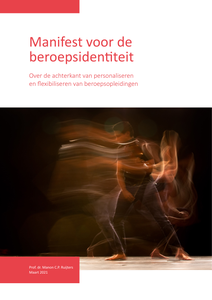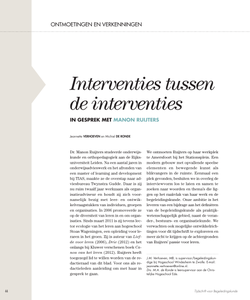Welke krachten maken dat professionals goed werken? Margreeth Kloppenburg over beroepstrots en beroepseer
LINK
Social work is a profession that is very much part of and contributes to an ever changing and evolving society. It is therefore essential that social work is able to respond to the diverse and dynamic demands that it may encounter in that society and in the future. The critique of social work is, however, present and growing. The profession can no longer deny or ignore the need to legitimize its value and effectiveness. In this article, a research project – entitled Procivi – aimed at developing a method of legitimizing social work is presented. The method developed in Procivi proposes a way of legitimizing social work through the development of reflective professionals. The method teaches professionals to take a research frame of mind towards their own practice and helps them develop a vocabulary to describe their work to different audiences. The paper discusses whether and how this method forms a viable way of legitimizing social work and as such could be an alternative for the growing demand for social work based on scientific evidence (evidencebased practice, EBP).
MULTIFILE

Innovatie in het beroepsonderwijs loopt haast onherroepelijk vast, omdat pioniers meer energie moeten steken in het bestrijden van bijzonder sterke tegenkrachten dan in het innoveren op zich. Wil de sector écht het onderwijs vernieuwen, dan zullen vijf peilers het fundament moeten vormen waarop professionals met engagement aan de slag kunnen. De auteur somt ze op.
DOCUMENT

Beroepsidentiteiten staan onder druk. Er is meer aandacht nodig voor beroepsidentiteit om de negatieve effecten van professionaliseren en flexibiliseren te voorkomen. Daarom schreef de Onderzoeksgroep Professionele Identiteit in het initiële onderwijs onder leiding van Manon Ruijters het Manifest voor de beroepsidentiteit. Het manifest is een noodkreet aan opleiders en begeleiders om er meer zorg en aandacht aan te besteden. Zonder dat vormt de huidige aandacht voor personaliseren en flexibiliseren een serieus risico. Dan werken we niet toe naar wendbare, sterke professionals, maar staan professionaliteit, interprofessionele samenwerking, en ook het persoonlijk en professionele welzijn van onze professionals op het spel.
DOCUMENT

De tuinbouw sector is een innovatieve sector waar veel gebeurt en die sterk in ontwikkeling is. Er zijn veel vacatures op allerlei gebied: als gewasverzorger, als teeltspecialist, maar ook als manager logistiek, als HRM-er in een commerciële functie. Alleen weten veel mensen dat niet. De kloof tussen de blik van buiten t.o.v. de blik van binnen is groot. In dit project hebben we actuele realistische beroepsbeelden ontwikkeld in co-creatie met zes bedrijven welke kunnen bijdragen aan imagoverbetering van de sector en aan de doorontwikkeling van HRM. De bijlagen zijn op te vragen via BRC@inholland.nl
DOCUMENT

Op 28 juli 2014 is Ben Fruytier overleden. Hij was lector Organisatieconfiguraties en Arbeidsrelaties bij het Kenniscentrum Sociale Innovatie (KSI) van Hogeschool Utrecht (HU). Tevens was hij als universitair hoofddocent werkzaam bij de Faculteit der Managementwetenschappen van de Radboud Universiteit (RU Nijmegen). Aan deze universiteit heeft hij arbeid- en organisatiesociologie gestudeerd en is hij cum laude afgestudeerd. Hij was leerling van Ulbo de Sitter en heeft een belangrijke bijdrage geleverd aan de verdere ontwikkeling en toepassing van de sociotechniek in Nederland. In 1987 heeft hij de werkgroep Productie Organisatie en SocioTechniek (‘POST-groep’) opgericht, waarin wetenschappers, organisatieadviseurs en stafmedewerkers van bedrijven en vakbonden werkten aan de professionalisering van het vak van (sociotechnische) organisatieverandering.
MULTIFILE

Deze rapportage bevat een analyse van het maatschappelijk debat over de terreinen onderwijs, cultuur, wetenschap en media. De analyses zijn in de periode 2010-2015 gemaakt. De analyses van het maatschappelijk debat zijn bedoeld om het beleid beter te doen aansluiten bij de maatschappelijke vraag. De analyse van het media-debat is van de hand van Andra Leurdijk en Saskia Welchen.
DOCUMENT

In gesprek met Manon Ruijters. In dit gesprek wordt gezocht naar woorden en thema’s die liggenop het raakvlak van haar werk en debegeleidingskunde. De ambitie is hetleveren van een bijdrage aan het definiërenvan de begeleidingskunde als praktijkwetenschappelijkgebied, naast de verander-,bestuurs- en organisatiekunde
DOCUMENT

De publicatie ‘De kracht van verbinding: Loopbaanthematieken in het licht van veranderende beroepsbeelden” is modulair opgebouwd. Iedere module behandelt een stukje van de thematiek, waarbij steeds vanuit een ander perspectief wordt gekeken: vanuit kiezende jongeren, vanuit de veranderingen die plaatsvinden in de maatschappij en die ons werk beïnvloeden, vanuit de Nederlandse arbeidsmarkt, vanuit onderwijsorganisaties en vanuit arbeidsorganisaties.
DOCUMENT

De lectorale rede start vanuit een verkenning van de woorden uit het thema van het lectoraat. In de hoofdstukken erna wordt gekeken naar de drie vragen rondom professionalisering: waarom professionaliseren, hoe professionaliseren en wat/waarin professionaliseren. Hierna wordt de thematiek teruggeplaatst in de context van het lectoraat.
DOCUMENT
